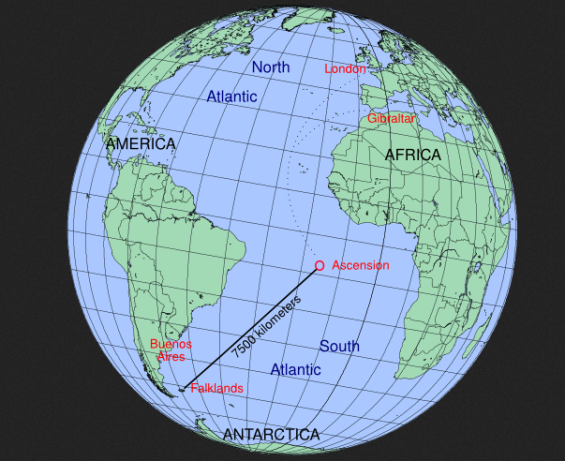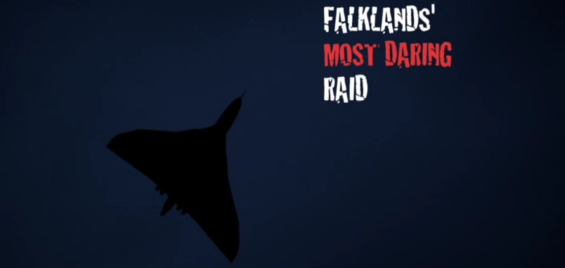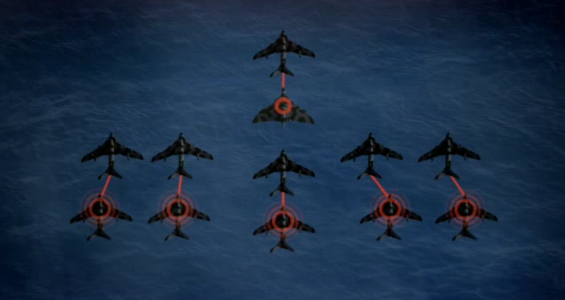
Posted by Jenny Colvin



I first heard about Operation Black Buck after watching a Channel 4 broadcast in anticipation of the 30th anniversary (April, May, and June of 1982) of the Falkland War. Falklands’ Most Daring Raid was the “humorous, heroic story of how a Cold War-era Vulcan flew the then-longest-range bombing mission in history with a Second World War bomb that changed the outcome of the Falklands War.” It’s a great watch (and is available via torrent HERE).

And now, thanks to BBC Radio 4 (and RadioArchive.cc) there is as a companion to that doc. And it is a very satisfactory BBC Radio 4 dramatization too!
Like the Dam Busters and Doolittle raids, the story of Operation Black Buck strikes me as an inspirational engineering problem. A kind of wartime terrestrial Apollo mission, but done with 1950s technology.
Operation Black Buck was conducted from Ascension Island in the mid-Atlantic to the Falkland Islands as a part of the initial British response to the invasion of the Falkland Islands by Argentina. That 7,500 km distance required an stunning amount of mid-air refueling check out this diagram:



 Afternoon Drama: Operation Black Buck
Afternoon Drama: Operation Black Buck
By Robin Glendinning; Performed by a full cast
1 MP3 – Approx. 44 Minutes [RADIO DRAMA]
Broadcaster: BBC R4
Broadcast: June 5, 2012
During the Falklands War 30 years ago, the RAF staged the world’s longest bombing run, in an attempt to damage the runway at Port Stanley. Using ageing Vulcan bombers, crews flew a round trip of 8000 miles from Ascension Island to the South Atlantic. Such a journey required not just in-flight refuelling, but re-fuelling of the refuelling planes – a hazardous undertaking that had never before been attempted on such a scale.
In this drama, Robin Glendinning recreates the nail-biting adventure. Not only were the raids themselves difficult to pull off, but even getting the aircraft ready for the flights was a major task. Aviation museums across the world were raided for spares, and key parts retrieved from junkyards.
But there are those who question whether or not the operation was militarily useful – or whether or not the same job could have been done more effectively using planes attached to the naval task force. Was this really about war, or was it about the RAF trying to carve out a role for itself in a conflict that threatened to be entirely dominated by the Army and Royal Navy? And how successful were the raids anyway?
Producer: Jolyon Jenkins
I got this show via torrent from our friends at RadioArchive.cc.
Posted by Jesse Willis

Professor Michael Saler, of UC Davis, suggested I check out his talk about “History and Imaginary Worlds” which he gave at a TEDx at UC Davis.
Saler’s talk reminded me of something Dave Barry said.
He said he wanted to get an Amtrak jersey made, like one of those football or hockey style oversized jerseys. He wanted to get an Amtrak logo emblazoned on the front of it, and have two little ones put onto the shoulders. He wanted to have “GUNN” stitched on to the back of it (David Gunn was the president of Amtrak at the time). He wanted to walk around in public wearing it, and quote statistics about how many miles of track Amtrak had laid down, and to tell everyone how many passengers it delivered in it’s 2003 “season.”
I guess he thought that a lot folks might think it strange if a grown man walked around wearing a costume of one of his heroes. He didn’t want any of those normal sports fans to think he was strange.
Posted by Jesse Willis

 The SFFaudio Podcast #170 – Jesse, Tamahome, and Jenny discuss the Brilliance Audio audiobook of The Fountains Of Paradise by Arthur C. Clarke.
The SFFaudio Podcast #170 – Jesse, Tamahome, and Jenny discuss the Brilliance Audio audiobook of The Fountains Of Paradise by Arthur C. Clarke.
Talked about on today’s show:
Skyhooks and space elevators, Sri Lanka, “my first space elevator book”, Robert A. Heinlein, Friday, “it feels like a novel”, “the fictional accounting of a real construction project”, history, Colombo, afterwords, sources and acknowledgements, “what a rip-off”, Sigiriya’s Lion Paws Gate, King Kashyapa I, “past, present, and future”, engineering fiction vs. science fiction, Taprobane, Paradise Regained by John Milton, Jo Walton’s review of The Fountains Of Paradise, religion, “Heinlein in a dress”, an idea book, to think interesting Science Fictional thoughts, hard SF, Clarke’s Laws, space probe, a game changer, Gregg Margarite, Shri Jawaharlal Nehru, The Nine Billion Names Of God, Sigmund Freud, growing out of religion?, Thomas Aquinas, symbolic logic, Bertrand Russell, satellites and their uses, unseen benefits to giant engineering projects and science, Sydney Opera House, the Eiffel Tower, Burj Khalifa, Mission: Impossible – Ghost Protocol, “this is what we’re meant to do”, the space age, the 1970s, Jenny gets depressed, Terpkristin‘s visit to French Guiana (PICS!), will we have a Chinese moonbase by 2022?, innovation vs. exploration, Jerry O’Neil, good reasons to go to space, we ought to do things that we can do, Leviathan Wakes by James S.A. Corey, the daily life challenges of a space born population, The Island Worlds by Eric Kotani and John Maddox Roberts, the probe is a person, The Geek’s Guide To The Galaxy #64: John Scalzi, (Star Trek holds us back), “the God Particle”, “you’re going to die soon”, can we empathize with a character that isn’t a human being?, a complimentary cosmonaut, 2001: A Space Odyssey, one day in Jerusalem, the transhuman future in the end of The Fountains Of Paradise, Starglider/Starholme, a well developed solar society, the Wikipedia entry for The Fountains Of Paradise, The Last Theorem, The City And The Stars, a non-off putting post-human story, Childhood’s End by Arthur C. Clarke, Fahrenheit 451 by Ray Bradbury, Ted Chiang, Charles Stross, sequels and science, Star Trek: The Next Generation, Alastair Reynolds, Kim Stanley Robinson, in SF ideas build can on one another whereas others books are more parasitizing upon those ideas, why does it have to be a new book?, ‘these were the stepping stones to today’, a balance of both a good story and good ideas, William Gibson, Embassytown by China Miéville, The City And The City, “garbage, garbage, garbage”, 2312, Playboy’s serialization of The Fountains Of Paradise, Buckminster Fuller, why did Sir Arthur C. Clarke live in Sri Lanka?, Milton is literature, Dante’s Inferno, Lucifer’s fall from heaven, Brilliance Audio, A Fall Of Moondust by Arthur C. Clarke, BBC Radio dramatization of A Fall Of Moondust, Crisis On Conshelf Ten by Monica Hughes, “best book ever”, The Abyss, Tom Swift, Aquaman vs. The Sub-Mariner, Blue Remembered Earth by Alastair Reynolds, The Prefect, Ray Of Light by Brad Torgeson, “Alien sun mirror block deepwater living daughter Glimmer Club surface discovery.”, the Mars tangent, Phobos and Deimos, John Scalzi, “I liked that he didn’t explain it.”, “we don’t build em that way”, “I want it to be hard”, Phobos interference would be a feature not a bug, “wiggle the thread”, atmospheric density and windspeed, carbon nano-tubes vs. buckminsterfullerene, Roald Dahl, Charlie And The Great Glass Elevator, horror, The BFG, Jack McDevitt, a waking dream, in the shadow of Vesuvius, the Prime Directive, Doctor Who, Fantasy vs. Science Fiction, Inferno (Doctor Who episode), Sliders, Doorways by George R.R. Martin, Tom Baker.





Posted by Jesse Willis

AudioGo has collected the popular BBC Radio 4 programme The History Of The World In 100 Objects as I guess what we’d call a 25 hour radiobook.
In 2010, the BBC and the British Museum embarked on an ambitious project: to tell the story of two million years of human history using one hundred objects selected from the Museum’s vast and renowned collection.
Presented by the British Museum’s Director Neil MacGregor, each episode focuses on a single object – from a Stone Age tool to a solar-powered lamp – and explains its significance in human history.
Music, interviews with specialists and quotations from written texts enrich the listener’s experience. On each CD, objects from a similar period of history are grouped together to explore a common theme and make connections across the world. Seen in this way, history is a kaleidoscope: shifting, interlinked, constantly surprising and shaping our world in ways that most of us have never imagined.
This box set also includes an illustrated booklet with additional background information and photographs, and each CD includes PDF images of the featured objects.
The landmark series on BBC Radio 4 that tells the story of humanity through 100 man-made objects from the British Museum’s unique collection.
Posted by Jesse Willis